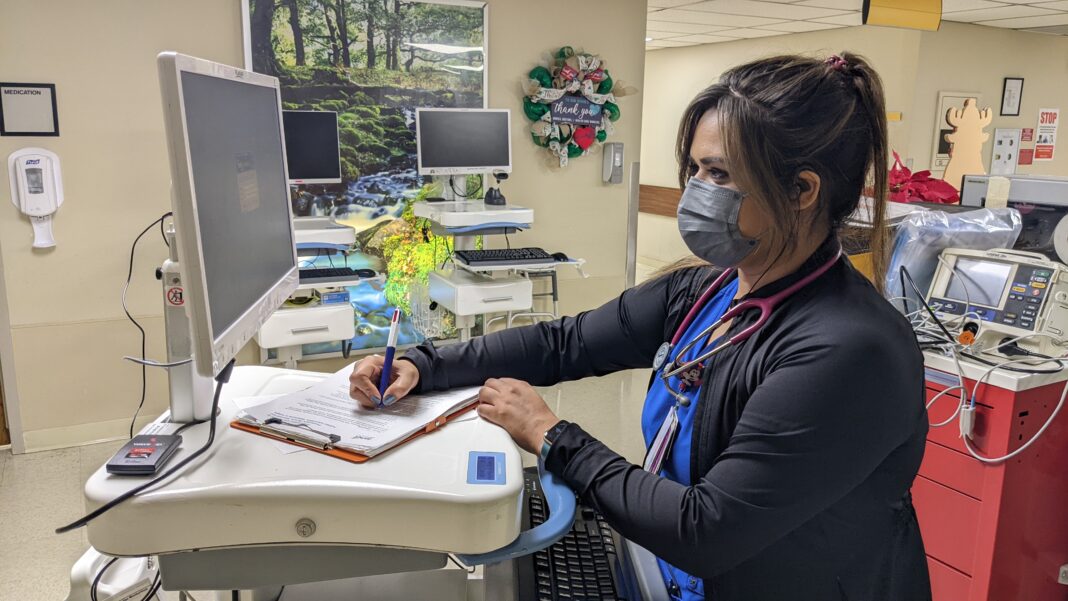HARLINGEN — It was just too much.
Seeing COVID-19 patients in agony, too often unable to alleviate suffering, working under the constant threat of infection themselves, many nurses have left the hospitals.
“What you’re seeing across the country is a lot of people for one reason or another have exited their careers in health care, or they’ve taken a new direction, but they’ve decided not to be nurses in hospitals,” said Dr. James Castillo, Cameron County Health Director.
The situation in hospitals and emergency rooms, seeing patients lying in hallways and bodies being stored where space was available, ambulances being overtaxed and military medical personnel moving in to take up the slack — it’s been traumatic for everyone.
“Burnout is not a personal fault,” said Castillo. “Human beings are human beings. They can only take so much. Doctors, nurses, nurses’ aides, respiratory therapists, everybody’s a human being, and this has done a lot of things to people’s families.”
Valley Baptist Medical Center has seen nurses and other medical staff leave for a variety of reasons, said Stephen Hill, chief nursing officer.
“Many times they may not list it as burnout,” he said. “They may say, ‘I’m going for a job that’s less stressful.’ They may not leave the profession, but they may go work in a physician’s office instead of being in the acute care hospital. Or they may leave the ER and go to a lower acuity like a wound care type center.”
Some left the hospitals as soon as the pandemic hit because they weren’t comfortable working in that situation.
“We did have several nurses in March 2020 and April 2020 who were scared or concerned for theirs and their family’s safety,” he said. “But again, they left the acute care hospital and went to work in other areas.”
Harlingen Medical Center experienced a similar departure of nurses.
“Some people did leave at the beginning of COVID,” said Amy Flores, chief nursing officer for HMC. “They didn’t know what they were getting into, and some of them left the profession.”
However, the shortage in nurses is also due to an increase in the acuity — or severity — of patients. That severity requires more nursing staff, thus an even greater shortage.
During the worst of the pandemic, many patients delayed treatment for fear of getting COVID-19 at hospitals or doctor’s offices. Preventive medicine was put on hold to slow the spread of COVID-19 and to divert all resources to the crisis.
“They are delaying coming in so by the time they come in they are very sick,” Flores said. “Here in the Valley we have a lot of diabetes, high blood pressure, high cholesterol, what we call comorbidities. That’s what makes them sicker.”
Valley Baptist Medical Center has seen the same thing.
“I do believe people put off their health care whether because they themselves put it off or because we were not doing elective cases,” Hill said. “We were not doing those procedures. So yes, we’re trying to catch up right now. And I would say yes. Anytime you put off any preventive maintenance whether it is your car or your body, it’s going to catch up to you.”
It has also changed the way many health care providers view their professions. Many of them saw significant changes in their finances. Some made a great deal of money as traveling nurses, giving them the financial freedom to further their education. Others changed careers altogether.
Regardless of the reasons, the result of so many nurses leaving at once has been the same — a staffing crisis. Registered nurses can’t be replaced at the same rate they’re leaving. Their expertise requires years of schooling, training and experience.
“It’s going to take a long, long time for that void to be filled,” Castillo said. “That’s what hospitals are struggling with. They can’t keep the number of beds staffed. If you don’t have enough staff for the beds, then the ERs start to fill up with people waiting for beds.”
People shouldn’t be misled if they see plenty of empty rooms in hospitals claiming to be full. If there aren’t enough nurses to take care of people in those rooms, those rooms won’t have patients.
Both HMC and Valley Baptist sang high praises for the nurses and other staff who have kept working in the hospitals through the duration of the crisis.





